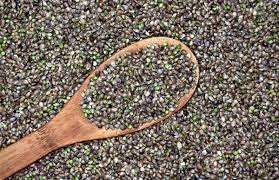The health-conscious people are now more focused on healthy dietary additions to unlock their next health level. This focus has caused the flax and hempseed to be in fashion. These ancient seeds are full of edible and soothing oils, proteins enriched with essential amino acids and necessary fatty acids. Seeds have a particular form of antioxidant known as lignans. The duo of lignans and ALA serve as anti-inflammatory and lignans can also assist in lowering the blood cholesterols levels. To get the maximum nutrients of flaxseeds, use them in grinded form. The most all-rounded and perfectly balanced nutritional profile is of hemp seeds as hempseeds consist of fatty acids, dietary fibres, and protein with all amino acids. This makes it the best choice for vegetarians.
Why Should You Add Seeds to Your Diet?
Pumpkin and Hemp Seeds are High in Protein
You have found the magical solution if you are looking for a complete source of protein because hemp seeds are full of protein and have nine essential amino acids. Proteins are made up of amino acids. All of the amino acids cannot be produced by the body so everyone must take them in the diet. Hemp seeds are compared to soybeans when it comes to protein. In every 3 tablespoons or 30 grams of seeds, you will get 9.46 grams of protein. Hemp seeds are a very important source of protein and especially have arginine that is best for cardiac health. We recommend taking hemp extract in the form of CBD oil for added benefits.
A Source of Fibre and Micronutrients
Another main factor that will convince you to take hemp seeds is that it contains a lot of fibre in its shell. That’s why always buy hemp seeds with its shell but if you cannot purchase them with shells, they are still very beneficial. Approximately 3 tablespoons of hemp seeds contain 1.2 grams of fibres. Fibber intake can help you to lose weight, reduce appetite, improves gut health, and balances sugar level in the blood.
Vitamins and Minerals
Hemp seeds have a lot of vitamins and minerals, especially they contain phosphorus, vitamin E, potassium, and magnesium. They also contain a lot of zinc, Vitamin B, and iron. Other essentials like vitamin B-6, niacin, thiamine, folate, and riboflavin are also found in hemp seeds.
Omegas in Seeds Protect the Brain
In a recent study published in the Food Chemistry journal, it was found that hemp seeds in the lab tests have shown antioxidant effects. Maybe it is because of the cannabinoid present in the hemp seeds. Another research has shown that CBD present in the seeds with other substances has anti-inflammatory, neuroprotective effects, and a positive impact on the immune system. They are also beneficial in the neurological treatment of neuropathic pain, Parkinson’s disease, Alzheimer’s disease, and childhood seizure problems.
Boost Heart Health
Many medical professionals believe that omega-3 fatty acids present in the hemp seeds are best for heart diseases and reduce the rush kg heart attacks and arrhythmias. Hemp seeds are beneficial for a healthy heart because they have a balanced ratio of omega-3 and omega-6. They also have a high amount of arginine that changes into nitric oxide. It is very important for keeping the blood vessels elastic and smooth. Also, helps to keep
Best Ways to Add Chia or Hemp Seeds to Your Diet
While they’re packed with a lot of nutrients and hence are very beneficial for health. The seeds we eat are not only provide high protein content but also add essential fibre to your diet. Therefore, they are a key ingredient of your diet. The most effective way to incorporate them into your diet is:
- Sprinkling the seed either whole or ground on yogurt and cereal.
- Adding these seed in smoothies.
- Using whole seed, you can make hemp milk.
- Consuming hemp seeds with salads and other nuts.
Why Add Flax seed to Your Diet
Flax seeds are for you if you don’t eat fish or are vegetarian because they are a rich source of omega-3 fats. They also contain alpha-linolenic acid that is known as a plant-based fatty acid. They are among the two most essential fatty acids that cannot be produced by the body, you must take them in the diet. These fatty acids have proven to be a shield for cholesterol being deposited in the blood that is harmful to the heart. It also decreases inflammation and stress.
Flax seeds are a rich source of dietary fibre they contain 3 grams of fibres that is enough for the daily intake of every person. There are two types of dietary fibres present in the flax seeds one is insoluble that is 60-80% and the other is soluble which is 20-40%. Soluble fibre is known for increasing the consistency of the intestinal contents and also lowers the digestion rate. However, the insoluble fibre encourages more water to stick to the stools and soften the stools. It prevents constipation.
Flax Seeds Lower Blood Pressure
Research has shown that flax seeds have a natural ability to lower the blood pressure in the body. If you eat 30 grams of flax seeds for six months regularly then your blood pressure will be lower than usual. Systolic blood pressure will be lowered by 10mmHg and diastolic will be lowered by 7mmHg. Another study has revealed that if you take flaxseeds daily for three months regularly then your blood pressure will be lowered by 2mmHg.
Conclusion
The food market, now the day is witnessing a trend of seeds I. e., flaxseeds and hemp seeds. Both of these are a powerful storehouse of various nutrients and vital compounds like protein, amino acids, lignans, and dietary fibres. These ancient seeds help you to achieve the perfect balance in your diet therefore they are key in any complete diet.
